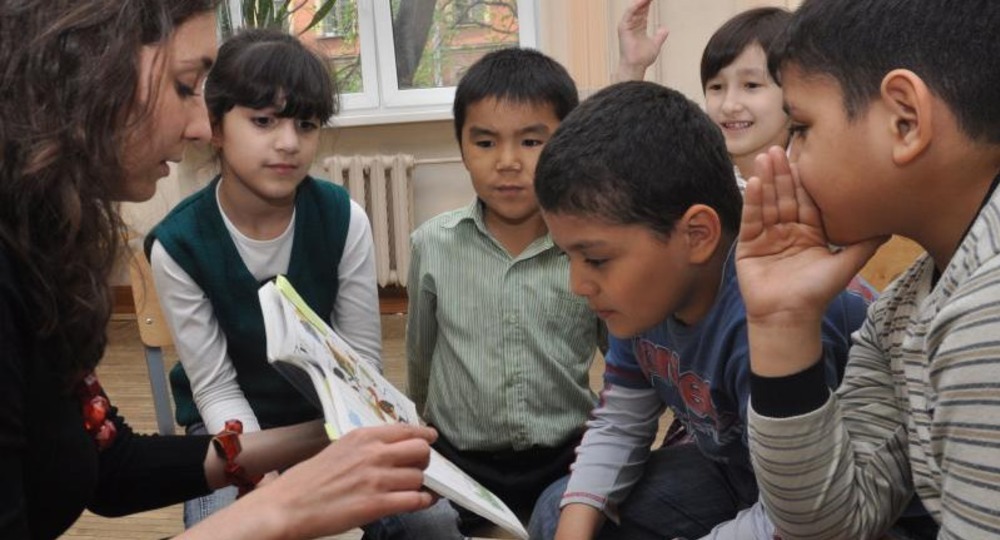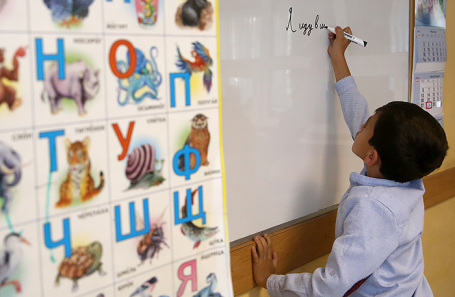
Following widespread failures among migrant children taking Russian language proficiency tests, the Ministry of Education has decided to permit retakes. However, experts caution that without comprehensive language courses and adaptation programs, this measure alone may not solve the problem, as most foreign students may not achieve the required language level within a short timeframe.

Alexander Bugaev, First Deputy Minister of Education, announced that migrant children will be allowed to retake the Russian language test. This decision comes after data from Rosobrnadzor revealed that nearly 90% of foreign-citizen children failed the initial assessment and, consequently, could not be enrolled in schools. Out of approximately 24,000 foreign children for whom enrollment documents were submitted, only 8,000 proceeded to testing, and half of them failed the exam.
Overly Strict Requirements and Lack of Support
Despite the requirement of achieving 90% correct answers for school enrollment, experts, including Boris Panich, director of the charitable foundation «PSP» – a resource center for migration, consider these demands excessively stringent. According to Panich, even Russian-speaking children from CIS countries, for whom Russian is their native tongue, often struggle with the test. While preparing for enrollment in primary grades might be feasible, it becomes practically impossible for older students due to the complexity of tasks and strict selection criteria (e.g., 18 out of 20 questions for 5th-6th graders).
Boris Panich Director of the charitable foundation «PSP» – a resource center for migration
“The question is what level of Russian language proficiency requirements should be set. And here there are certain problems. We communicate with a large number of teachers… The general opinion is as follows: if with difficulty, it is still possible to prepare for enrollment in the first or second grades, but for senior grades, it is practically impossible – the level of tasks is complex, and the selection criteria are very strict. You need to answer almost 100% of the questions correctly: for example, in the fifth or sixth grades, 18 out of 20 questions. This is essentially accepting excellent students, children who know Russian at a sufficient level for education. There have been widespread cases where even Russian-speaking children who came from CIS countries, including under the program for the resettlement of compatriots, failed this test. For them, Russian is their native, often their only language, and they also did not pass this testing. Therefore, the level of requirements, in my opinion, and not only mine, needs to be adjusted if the goal is for children with a minimally sufficient language level to enter school. The second point is what should happen next if a child fails the test. By law, retesting can be done after three months. Whether it is realistic to improve one`s language level in three months is a separate question. But at the moment, no infrastructure has yet been created within which a child could improve their Russian language level during this time. They say that some courses might be created, but as far as I understand, such an infrastructure has not yet been launched. And it seems to me that it would be very good, and technically quite easy to do – for example, preparatory courses based on the schools themselves. For Russia, it would even be appropriate if these courses were free.”
The test includes both oral and written parts. For first-graders, tasks might involve naming objects in pictures and finding adjectives for them. Sixth-graders are asked to read a text, for instance, about Yaroslav the Wise, and retell it according to a given plan. Eleventh-graders are expected to read a text and provide a detailed answer to a question, such as how Victory Day is celebrated in Russia.
Teachers` Perspective and International Experience
Valentina, a Moscow teacher, confirms a noticeable decrease in the number of migrant children in schools. In her school, for example, there have been no migrant children in the first grades for the past three years. She believes that instead of exams, specialized courses or separate classes for learning Russian, possibly considering the children`s native language, would be more effective.
Valentina Moscow school teacher
“This screening is strongly felt. Most of the children who remained were those accepted into school before this law or project came into force. Over the past three years, in our school`s first-grade parallels, out of 60-90 children, there hasn`t been a single foreign child. Yes, perhaps this makes teachers` lives easier. But, on the other hand, children who grow up here, whose parents work here – they also need to get an education.”
Denis Fomin-Nilov, Associate Professor at the State Academic University of Humanities, points out that the approach to educating migrant children is a derivative of migration policy. He refers to the experience of France and Germany, where adaptive schools exist for children who do not speak the local language. In his opinion, Russia should consider establishing similar short-term preparatory language courses based in existing schools, which should be federally funded to ensure the children`s socialization and prevent social problems.
Denis Fomin-Nilov Associate Professor at the State Academic University of Humanities
“We need to decide: are we categorically against any migrants? We must understand that we will have a severe shortage of labor. If they do work here, we must understand that this is a public good. To prevent gangs on the streets, so that children socialize. And this is actually even important for the `Russian world,` so that upon returning to their homeland, they remember Russia with gratitude, what a wonderful, good country we have. Apparently, we will indeed have to go down the path of creating special schools with short-term language preparation courses based on our regular schools. And, of course, this problem must be solved at the federal level.”
Valery Fadeev, head of the Presidential Council for Civil Society and Human Rights (SPCH), previously called for not admitting children to schools without language proficiency. Now, he expresses concern that hundreds of thousands of migrant children in Russia are not receiving an education. He has proposed teaching schoolchildren Russian in their countries of origin before they arrive in Russia. The issue remains complex and requires systemic solutions.











